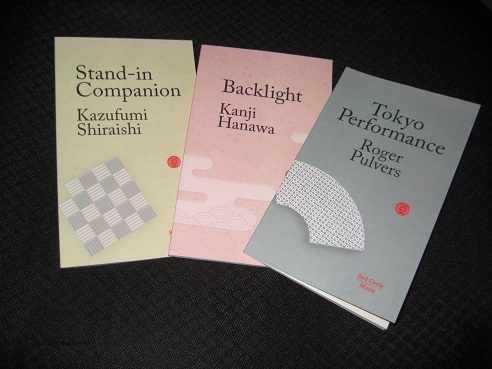Ian Josh Yates's Blog
June 10, 2022
A Quiet Place: Seicho Matsumoto
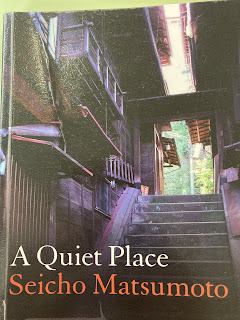
A Quiet Place:
Seicho Matsumoto
(Trans Louise Heal Kawai)
Enjoyable and worth a read!
Asai, a middling government bureaucrat with a younger second wife and a sexless marriage, is surprised in the midst of a business trip with the news that his lovely wife has passed away. Her weak heart gave way on a random Tokyo street and the doctors couldn't give her the help she needed.
This leads us into a mission of discovery for Asai, who more than anything is searching for meaning in a world where everyone seems to willingly put on any face necessary at any moment.
How did his wife really die? What was the truth of her life anyhow?
A few nice twists, but I think an opportunity was missed, as this would have been an even better read if the twist was a complete erasure of twists, if the mystery was that the mystery was just nothing at all.
What is Asai is just a nothing of a human chasing some meaning to explain why his existence holds any value.
The book never gets quite that deep in its thinking, but it is still a rather good mystery, with a bit of cultural insight, and recommended.
January 22, 2022
Kanazawa: David Joiner
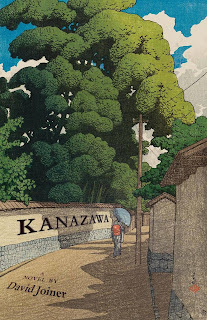
Overall, an worthwhile read.
The story of a man married, seemingly not just to his young Japanese wife, but to her hometown as well. But, what happens when it is the locals dream to escape the very place that her husband has connected to his future?
I didn't read this one straight through. At times, I put it down frustrated with the characters. These are people I don't completely align with, who at times come across as oddly lacking a sense of responsibility even, however, as I picked it back up and continued I began to get the sense that Joiner wasn't completely unaware of these ideas himself.
In the end, I think my slight difficulties were a result of Joiner crafting a work that defied simple characterization of youngish people trying to find themselves.
As a side note, I was called in to work a job just outside of Kanazawa in the midst of reading this book, and, as our protagonist persists in teaching us, it is a place to be fallen in love with.
Again, a worthwhile, and not overly simple read.
Thanks to the publisher for a review copy
June 25, 2020
Translator Interview: Eli K. P. William
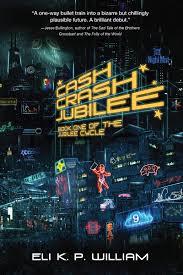
I was lucky enough to not only read the new book, A Man, by Keiichiro Hirano, but also to get a chance to do one of those things I love to do, talk to the translator. William is not just a translator, but, as shines in his writing, a writer of a number of really interesting works, such as Cash Crash Jubilee, pictured above. Below is the gracious answers of Mr. Eli KP William.
1) This was your first translation of a book, and also Hirano's first book to be translated into English. How did you become involved in this project? Had you read Hirano before?
To answer this question, I have to tell you about a collective I'm a member of called Humans in Literary Translation (HILT). The group is composed of fellow literary translators, Alison Watts, Louise Heal-Kawai, Matt Trevaud, and yours truly.
During one of our translation workshops in 2018, I mentioned in passing that I wanted to translate fiction similar to the fiction that I write. As soon as I said this, Alison, who had read my first novel, Cash Crash Jubilee, immediately told me to go read Dawn by Keiichiro Hirano, about which she had written a synopsis for a publisher.
After the workshop, I went straight to a bookshop and fell in love with the novel on the first page. Dawn is indeed strangely similar to Cash Crash Jubilee in some ways, both in how it depicts personal relationships in the near future and in its focus on the politics of technology, but also heads in a slightly more postmodern direction that I found enthralling.
When I told Alison my impression of Dawn, she and Louise both kindly put me in touch with the author, Hirano-san. I arranged a meeting with him and his agent for a few months later and in the meantime decided to pick up his latest novel. Although Hirano-san's most recent novel to be published in book form at the time was Matinee (an English translation of which, done by Juliet Winters-Carpenter, will be available later this year), there was an even newer novel of his, then only available in the magazine, Bungagukai. It was called A Man (or Aruotoko in Japanese).
My intention at the meeting was to ask about the translation rights for Dawn, but it just so happened that they were looking for a translator for A Man, and I was in the serendipitous position of being able to tell them that I had just finished and loved it. The agency, Cork, then asked me for a sample translation of the prologue, and the publisher, Crossing, selected mine out of a list of other samples.
And that is how I ended up translating A Man.
2) Are there any plans for another translation, of Hirano, or something else?
Juliet’s translation of Matinee is coming out later this year, as I said. I would love to translate Dawn, if I’m given the opportunity. Like Dawn, Hirano-san’s current serialized novel, Honshin, is a work of near future science fiction, and I’m looking forward to reading it as soon as it’s published as a book.
3) Do you think sharing certain attributes with an author makes it easier to translate? Do you think that you translate certain types of books or authors better, or do you think you could translate things that you don't have personal experience with?
I absolutely believe that certain translators go better with certain authors than others. I just finished reading the Aosawa Murders by Onda Riku and translated by Alison Watts, and I think that the novel turned out beautifully in English, in part because the voice of the author and translator matches perfectly. I can think of other cases, though I won't name names, where a highly skilled translator produced a less than ideal translation because the text of the novel clashed with their style. If you view translation as a form of collaboration, between the author’s mind passively embodied in the text and the translator actively connecting to that mind through the text, then it’s obvious that chemistry will have a big impact on the quality of the finished product, as it does with any cooperative undertaking.
Since my literary translation experience to date is limited, I’m still in the process of discovering what sorts of stories and authors I translate best. One thing I can say for certain, though, is that I translate authors better with whom I feel an affinity as a writer. In general, I suspect that translators do a better job if they are in love with—or at least like—the story they are translating. This inspires them to put in the extra effort to make the original sing in its new language.
I know other translators will disagree, but I think it's much harder to write something that you have no personal experience with than to translate it. If the familiar bromide “write what you know,” is half true, then “translate what you know” is probably misleading more often than not. For example, the protagonist of A Man is a lawyer, but I never felt that my lack of initial knowledge about Japanese law or the family register (koseki) was an impediment to successfully translating the novel. If I didn’t know something, I just looked it up and maybe did a bit of studying where necessary.
Of course you might not want to translate a language you don’t know! (I would be hopeless with any kind of ancient Japanese for example.) Also, literary translation is a specialized sub-field within translation that requires certain kinds of knowledge and skills. For example, good literary translators generally read a lot of literature. This is important for building up our arsenal of expressions and familiarizing ourselves with different voices and narratives. But, except in rare cases, I don’t think lack of experience with the subject matter is likely to affect the quality of a translation if the translator keeps their craft well-honed.
4) Do you see yourself as a writer or a translator, or both? Does being one help the other?
My view on this changes now and then, but right now I see myself primarily as a novelist, and literary translation as a facet of my novel writing. My main reason for saying this is that I spend a much larger portion of my creative time on my own fiction, and I don’t expect that to change in the long run.
I definitely find that being a novelist helps with translation, and vice versa. For example, novel writing requires the cultivation of voice, prose style, and compelling dialog, all of which are applicable to translation. Knowing the mechanics of narrative and symbolism from the perspective of a writer can also help to contextualize individual words and phrases, so that you can better understand their purpose within the whole of the story and more easily work out how they ought to be expressed in the target language.
On the flip side, there’s also a kind of alchemical transformation that can happen when a translator meets the work of a particular author. The new literary gold born from such an encounter was neither to be found in the original text nor could the translator have created it on their own. But once the translator has taken part in catalyzing this reaction, that gold becomes a part of their text-creating repertoire.
In slightly more concrete terms, a writer who also translates can discover new voices in the act of rendering a text into a new language that could not have been discovered in any other way. A new way of writing in the target language emerges from the interaction between translator and original text that is reducible to neither. Unlocking such creative techniques can help an author/translator to expand their range.
To give a specific example, translating A Man showed me how a novel can be written with minimal descriptions. Cash Crash Jubilee and the other books in my series, The Jubilee Cycle, tend to be heavy on visual imagery, whereas the focus in A Man is almost entirely on dialog, plot, characterization, and internal monologue rather than on setting the scene. The novel I’m currently writing relies on such a barebones approach to the description of place, and having a prior model that I translated makes this stylistic transition much easier for me to realize.
5) Please let us know where we can follow you and if there are any future projects you'd like people to look out for.
To learn more about me and my work, please visit my homepage:https://elikpwilliam.com
You can follow me on Twitter:https://twitter.com/Dice_Carver
I’m also on Facebook, though I’m not as active here:https://www.facebook.com/elikp.william/
May 21, 2020
A Man: Keiichiro Hirano
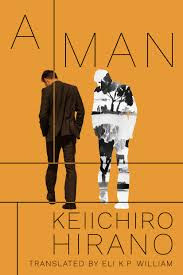
A Man
Hirano Keiichiro
Eli KP Williams (Translator)
(Published May 1st and June 1st 2020)
Memories make people who they are
I still sit here, in the midst of confusion and pandemic, but my head is clearer and my family is well.
So, I read, and I write.
And, I have been lucky enough to read a number of really good books, some of which appeared out of nowhere.
I was not familiar with Keiichiro Hirano, though he has many accolades, he hasn't yet to be translated into English. However, his Akutagawa prize at the age of 23, as well as winning the Yomiuri book prize for this very work, well, makes one anxious to get a copy.
And, I did.
And, I read.
And, I finished in just a few days.
And, it's a very, very good book.
The story is about Akira Kido, middle aged lawyer, and his search for the true identity of a dead man. Or, actually, maybe it's about the true identity of that dead man. Possibly it's about his wife... or maybe their son. It might be about a generations old onsen in the mountains of countryside Japan.
Or, it might be about all or none of that. It might be about what it means to be you, or me, or anyone.
As Kido searches for answers we learn of this mysterious Mr. X. What is his actual identity and why did he hide it? How could such a nice man need to hide his past? Was he a nice man? Does his past erase the actions of kindness and memories created with the family left behind.
As with any well written mystery, the audience is pulled along in the search for answers, but as with any really well written and planned mystery, the answer becomes less important, because the reality that our need to cling to defined identity is a safety net of sorts, or a crown of thorns.
I don't want to give anything away, so I won't describe much more of the plot, but I will bring up one plot point that comes up early and stays with all the action that follows.
Kido, is of Korean descent, having taken Japanese nationality during his teenage years.
Earlier this year I read the YA novel GO, by Kaneshiro Kazuki and though entertaining, and obvious for a high school audience specifically, it also dealt with being of Korean descent (North Korean in that work) in Japan. I felt a bit disappointed by the insights of that work, and despite not really being for adults, I thought that it could have done so much more with the subject (especially with it in many ways being Kaneshiro's real story).
A Man isn't really about Kido being Korean, but I found so much more insight into what it might feel like in the limited space spent examining it than in Kaneshiro's entire book.
Reading A Man brought up memories of incredible works of art I'd read or seen in the past. There's a bit of Citizen Kane here, with the mystery of who a man really is, and a bit of Wings of Desire, with a look at what it even means to be a human in the world. Hirano is aiming that high with his writing, and although those targets rest at the top of Everest, his final product lands in the thin air well above most books I've read from Japan in the last few years.
So, this book is very highly recommended and one of my favorites so far this year (I'll need to sit on it and think a lot to see if this ruminates more or less than Sayaka Murata's amazing Earthlings, review coming soon).
As compliments of Eli KP William, this could pass for an English language novel reasonably easily. Only it's setting and dependence of family registers make this a Japanese tale, and William's writing avoids the oddities of phraseology that sometimes plague new translators.
Overall, a highly recommended book that will satisfy the literature nuts that want something thoughtful and deep, as well as the mystery hounds who want a page turner. It lands softly right in the middle and will satisfy a very wide audience of readers.
 The author at his TED Talk
The author at his TED TalkApril 30, 2020
The Mad Kyoto Shoe Swapper: And Other Short Stories: Rebecca Otowa
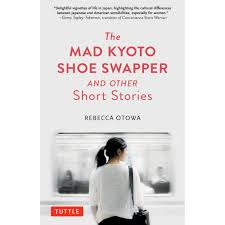 The Mad Kyoto Shoe SwapperThe Mad Kyoto Show Swapper And Other Short Stories
The Mad Kyoto Shoe SwapperThe Mad Kyoto Show Swapper And Other Short StoriesRebecca Otowa
160pp
Though I have read a lot recently, I have written very little. I could blame any number of things, from the noise of my children to the gloom that doesn't seem to disappear even when the clouds dissipate. Possibly I am lacking a sense of purpose that getting on my commute every morning for the nearly 16 years I have spent being an adult and being in Japan (basically those times overlap perfectly).
Reading has been my escape and my damnation of late. Picking up the news just emphasizes the things that hover over me, but picking up my books gives me chances to run away (without endangering my children anyhow).
However, even my escapes are interrupted, by the before mentioned children, and by my own thoughts, and so I have set up a schedule, where I will read for about 20 minutes, then clean or do something of obvious benefit and then come back to reading, and I have read that I am not alone in having to limit the amount of time I am reading into these small chunks, as it has been brought up in many Goodreads comments and even in the recent Japan Times article on recommended books. (Japanese Books to Get You Through the Lockdown)
So, those self obsessed and possibly insane ramblings was all to bring me to this point:
It's a hell of a good time to read short stories.
And so, maybe my purpose, at least at this moment, is to tell you about a great book of short stories: Rebecca Otowa's The Mad Kyoto Shoe Swapper.
Many readers will be familiar with Otowa's previous published work, At Home in Japan, all about her centuries old family home near Kyoto. That book, while not short stories per se, was a collection of vignettes. Along with her new work, Otowa is showing herself to have mastered the 20 page story.
So, what is the book about?
Story-wise, it could be said to be about anythings and everything: ghosts, family, history, chocolate, Kyoto...
However, thematically it is obvious that Otowa has some larger ideas in mind and those ideas pop up througout joining together the wide array of story subjects into a larger picture of Otowa's view of the world.
Possibly the largest theme here is the contemplation of what it means to grow older, with this theme stretching just a little more at times to look at what it means when you stop growing older.
Many of the short stories found here beautifully expresses the sadness and pain, as well as the wisdom and acceptance of becoming older. However, Otowa's true skill is not simply in expressing these things, but in never forgetting that this point of view is not singular. The sympathy shown for the young characters, who often misunderstand or fight with the elder ones, is what brings true power to the writing. Sympathy for older people doesn't mean that youth is merely folly.
The Turtle Stone stretches across more than 60 years to show the rise and demise of a family's sweet shop. The reader follows Taro from a young man trying to help and learn the business, to an old man who can't much remember the things he has learnt, let alone how to get home. However, the stages that Taro lives appear to stretch beyond him to represent the stages that we all go through, each one important, even if we tend to forget the ones we have stepped past. It is empathy, the old for the young, and the young for the old, that can bring us together.
This sympathy continues in what might be said to be the other major theme of this book, which would be the possibilities inherent in women.
As many of Otowa's characters pass through the cycles of life, it is undeniable how these parts of life are different for the female characters. Otowa puts forth completely realistic portrayals of times when the burden of duty weighs specifically heavy on the shoulders of females.
In Gembei's Curse, Sachiko begins as the put upon house wife domestically tortured by her father in-law, only to become the torturer of her own daughter in-law, Shinobu, as the cycle of life comes around. Will this just continue on forever? It will, unless something is able to stop it, like a simple apology:
"Excuse me. I'm sorry I shouted at you. You do so much for me. I am grateful".
This small apology brings forth the beauty of putting a stop to generational abuses, but also to the abuse that women at times put on women. One can imagine if the story were to continue it would lead to an even more understanding relationship when Shinobu grows old.
So, overall this is a work about age, the young and the old, and about the power of women and all humanity unstrained by the bindings that are often thrust upon us. It is a thoughtful work, but not heavy and possibly just perfect for someone looking for a quick escape.
To end I wanted to add a small quote that I found comforting in a time that has been reasonably uncomfortable. In the story Rachel and Leah, the character Rachel, in the midst of depression says:
Gardens are forgiving places, there is always another chance next year
I found that a comforting idea, that up until this spinning, winding, ride of life is over, there is still a chance for something a bit better. Here's to a beautiful garden, even if it takes a while to grow.
 Rebecca Ottawa
Rebecca Ottawa
April 20, 2020
A Clean Kill in Tokyo (John Rain 1): Barry Eisler
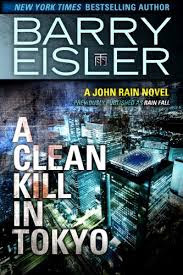
A Clean Kill in Tokyo (John Rain 1)
Barry Eisler
363pp
I am always reluctant to pick up anything new that I can't easily justify as educational in some way or another... however, that reluctance doesn't stop me often.
Compounding that was the kindness of a friend giving me some of his old books, including a few by Barry Eisler.
And so, I begin my relationship with John Rain, half Japanese hired killer in his first adventure, falling in love and killing bad guys in Tokyo.
I have read Jack Reacher from time to time and this is certainly in that vain, and I have named these kinds of books "Youtube fight books". Let me attempt to explain. If you ever come across a fight video on youtube (not something I recommend, but I think many of us have clicked a link of a story about someone being attacked on a bus or the likes) so much of these videos is dependent not on what happens, but on what is said and what the video is called. Seldom will you find such a video named, "two guys fight each other about a small disagreement'. Too boring, nobody would click, but maybe more importantly, nobody would share. More often you find the video names something like "Dude gets whats coming for hitting a woman", or "This is what happens when you steal", and as often as not the person recording the fight will add a commentary along those same lines.
How much of what's on youtube is real? I don't know and I assume sometimes somebody gets punched for hitting somebody's sister. However, people these days also seem wise to the fact that "Bully gets what he deserves" tends to go viral.
So, what does that have to do with books?
I enjoy Reacher, and I have begun to also enjoy these Rain books. I think they are well written, exciting, suspenseful and fun. However, there is zero doubt that they also walk the line between casual read and gross senseless violence (and sex). If you ever read one of these books, take a moment when you reach a kill and notice what the author does surrounding that action. The reader wants it, but also wants to deny the fact that he wants it. We need an out, an excuse for not denouncing such trash. We need a guy yelling in the background of the youtube video that the guy with the bloody nose hit a woman, stole money, or whatever, but is certainly a "bad guy".
As for me, I write long explanations on my blog to justify why I don't condemn such books.
And to my review: It's a fun book. I have already continued on to the next one... and the third as well. I will likely read all nine of them, at least if Eisler can keep my interest. I can enjoy a good revenge story. I like Death Wish to a certain degree, and I love The Searchers (which is certainly on another level). I wouldn't recommend this book to my mother, and honestly, and maybe showing my ignorance, when I pass this on, I doubt any women in my circle will come to mind to share it with. This is a dude book, full of swearing and fighting and fu.... other things.
So, give it a try if you like spies, revenge, espionage, and the likes.
 Barry Eisler
Barry EislerApril 17, 2020
2020 J-Lit Releases

2020 Releases:
I am hoping to use this space to list all the releases of Japan related books this year. It will be updated and I envision a full list as time allows. Feel free to message me below, or on twitter if you have anything missing. Special Thanks to the Japan Literature Goodreads group for sharing many of these.
January
February
13/ Where the Wild Ladies Are: Aoko Matsuda
Killing Kanoko/ Wild Grass on the Riverbank: Ito Hiromi
March
1/ The Only Gaijin in the Village
5/ Spark: Naoki Matayoshi
24/ The Mad Kyoto Show Swapper: Rebecca Otowa
April
15/ The Running Boy and Other Stories: Megumu Sagisawa
May
12/ Breasts and Eggs: Mieko Kawakami
June
1/ A Man: Keiichiro Hirano
July
August
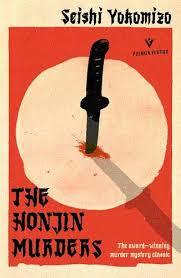 4/ The Honjin Murders: Seishi Yokomizu
4/ The Honjin Murders: Seishi Yokomizu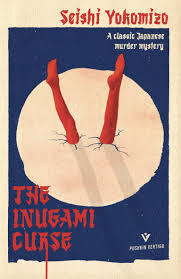 25/ The Inugami Curse: Seishi Yokomizu
25/ The Inugami Curse: Seishi YokomizuSeptember
1/ Who We're Reading When We're Reading Murakami: David Karashima
24/ The Decagon House Murders: Yukito Ayatsuji
October
November
24/ The Hole: Hiroko Oyamada
March 22, 2020
The Only Gaijin In The Village: Iain Maloney
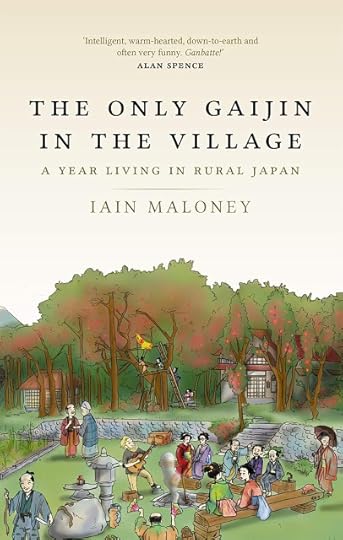
The Only Gaijin In the Village
Iain Maloney
245pp
All the time in the world, and I just have trouble sitting down and reading, let alone writing. I'll assume that people may be able to follow, but, I sit here, now, healthy, and with so many great books read or to be read, I will try and write between the screams of or at my children about homework.
And so, a book I read a few months ago, and have shared on my Goodreads, but haven't written up a full review yet.
The Only Gaijin In the Village by Iain Maloney is an adaption of Maloney's Gaijinpot blog from a few years ago and is a year in Japan bio, but thankfully, not the overly common first year in Japan bio. This, if memory serves me, is more along the line of a tenth year in Japan, but the first year in a new place.
So, this becomes not really a travel book, but a found a new home in a different world, which though episodic in nature and design builds a through line with the seasons of the year and life and creates a singular vision throughout.
For anyone not familiar, let me assure you that Japan is not Japan is not Japan, and that there are a million different little Japan out there.Tokyo isn't Osaka, and certainly neither of those are anything like a small town in the middle of Nagano. It is a very unique place to be, with a tremendous amount of challenges and rewards. This gives Maloney's work enough difference from some of the other Japan biographies that appear.
Personally I love this genre, (though I know some don't and for those... why would you read this book anyway) and I appreciate any time an experienced writer puts one out, and Maloney, this being his 4th book, has honed his skills and uses them here to expose beauty, and depth often missed in the Japan story.
Additionally, putting this above many other "life in Japan" stories is Maloney's insight, more than just initial reactions to the new and absurd or interesting, but at times far past that to some real meaningful looks at what it means to leave a home and family, and what it means to find, or try an find your new home and family.
I'll throw an additional complement by saying that while Hemingway makes me want wine and Booth makes me want a roadside beer on a Japanese country road, Maloney here makes me want a fire in my yard and enough space to enjoy it. I need an escape from the city, let alone the confines of my house.
Recommend and I hope people pick this up and take your mind off things for a bit.
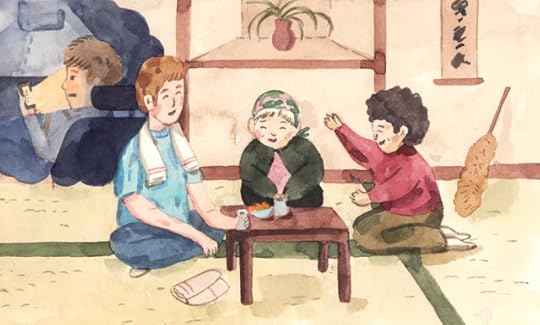 Illustrated by Justin Wong
Illustrated by Justin WongJanuary 10, 2020
Kitchen: Banana Yoshimoto
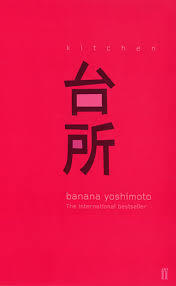
Kitchen
Banana Yoshimoto
Megan Backus (Translator)
150pp
This week I return to Banana Yoshimoto, possibly a fitting way to begin the new year after a year in which I simply didn't read or write as much as I had hoped to do.
So, Kitchen, a story of people stuck, seems like a perfect place to attempt to get myself going.
I will likely attempt to do smaller reviews this year, but hopefully still try and examine what it is that makes J-lit so valuably different and a counterpart to other countries literature.
So, lets begin!
In Kitchen, Yoshimoto gives us the sad, but subtly and never overbearingly sad, story of Mikage. Mikage has just lost her grandmother, the only living relative she had, and is faced for the first time with decisions such as how to live her life.
Yoshimoto has a real talent for creating the melancholy of these situations. Her writing is never unpleasant and actually lovely to read, but the sadness permeates everything, and this sets up what could otherwise seem like an odd series of choices for Mikage.
However, it seems perfectly natural that when an acquaintance, Yuichi, offers Mikage a sofa to sleep on, she takes it. Most authors would likely create a financial excuse here, but Yoshimoto is too confident to need one. Instead, the loneliness of a new apartment is so unbearable, and not specifically for Mikage, but for the readers, that there's joy in Mikage's acceptance.
Yuichi lives with his mother, the transgendered woman who once acted as his father, a joyful character who doesn't get enough time in the pages of this work. She seemed to signify the beauty of accepting the changes that must come, as the younger characters are simply unable to move.
I'll spend no more time on the plot, as the set up is enough to detail the positives that sit throughout this work, but finish here with what is likely the most powerful and touching part of this work, so much so that it was given the place of title.
The kitchen of the title here is a place of warmth and creation. Yoshimoto never pushes these ideas too strongly, but the sofa where Mikage rests her head at night is never separated by any wall from the warmth of the cooking or the boiling of tea water. Instead of being annoying, the late night noises of post-work bites and nibbles are a comfort to the lonely girl. I don't think it would be too far to suggest that the kitchen is the grandmother we never really meet within the pages of the book. I don't know if it's completely universal, but the connection between the love for a grandmother and her cooking seems like something most of us can taste, smell, and feel years after the cooking stopped.
For myself, the only thing stronger is my memory of the sofa in my grandmother's living room. Old, slightly worn, not quite a perfect fit for it's place, but oh so comfy, and maybe not really for the feel of the darned old thing, but for the sleep it invited. As Mikage finds comfort in the heat of the teapot, I couldn't help but remember the safety of that sofa and the assurance that I could sleep there basked in the love of those protecting me.
While it might be argued that this, and much of Yoshimoto's writing is a bit simple, and that she can be even more frustrating that Haruki Murakami, who she shares some stylistic talent with, however, her books bring forth, from me, and I suspect many of her readers, that warmth that I left behind on my grandmother' sofa.
A sweet, simple, but memorable little story.
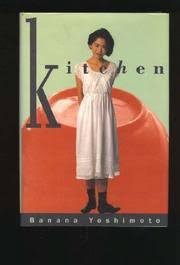
December 10, 2019
Stand-in Companion
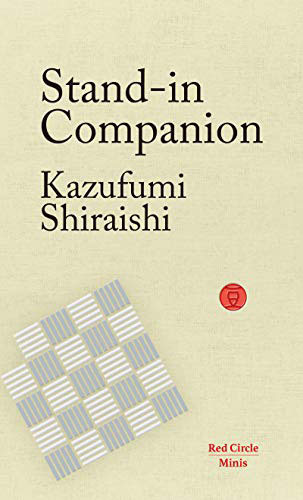
Stand-in CompanionKazufumi ShiraishiRaj Mahtani (Translator)42pp
Another wonderful short story published by the Red Circle Publishers bringing eyes to writers who deserve a wider audience.
This book, though short, grows itself slowly to unwind first one level, then more and more levels, of questions about what it is to be human and what it is to be in a relationship.
We have the story of heartbreak, followed by a unique and very misdirected plot for revenge.
When Yutori's husband Hayato chooses to leave her, possibly due to his inability to stop blaming her for their lack of an offspring, it is just too heartbreaking to accepts. Luckily this future world has the option of a "stand-in companion". With all the memories (well, maybe not all of them) of your former love, all packaged in a suitable undetectable android form, what could go wrong.
With such a short story, I won't go any further with plot details and speak more about impressions instead.
There is a lot of Charlie Kaufman here, with obvious connections to Eternal Sunshine, with themes of love lost, found, abandoned and the real meaning of memories.
There is a sadness and touching beauty to this novella, with just a little vagueness and confusion, appropriate to the ideas under examination.
Recommended highly and a perfect introduction to Shiraishi, who will hopefully follow this up with some more translations being made available to the English audience.
